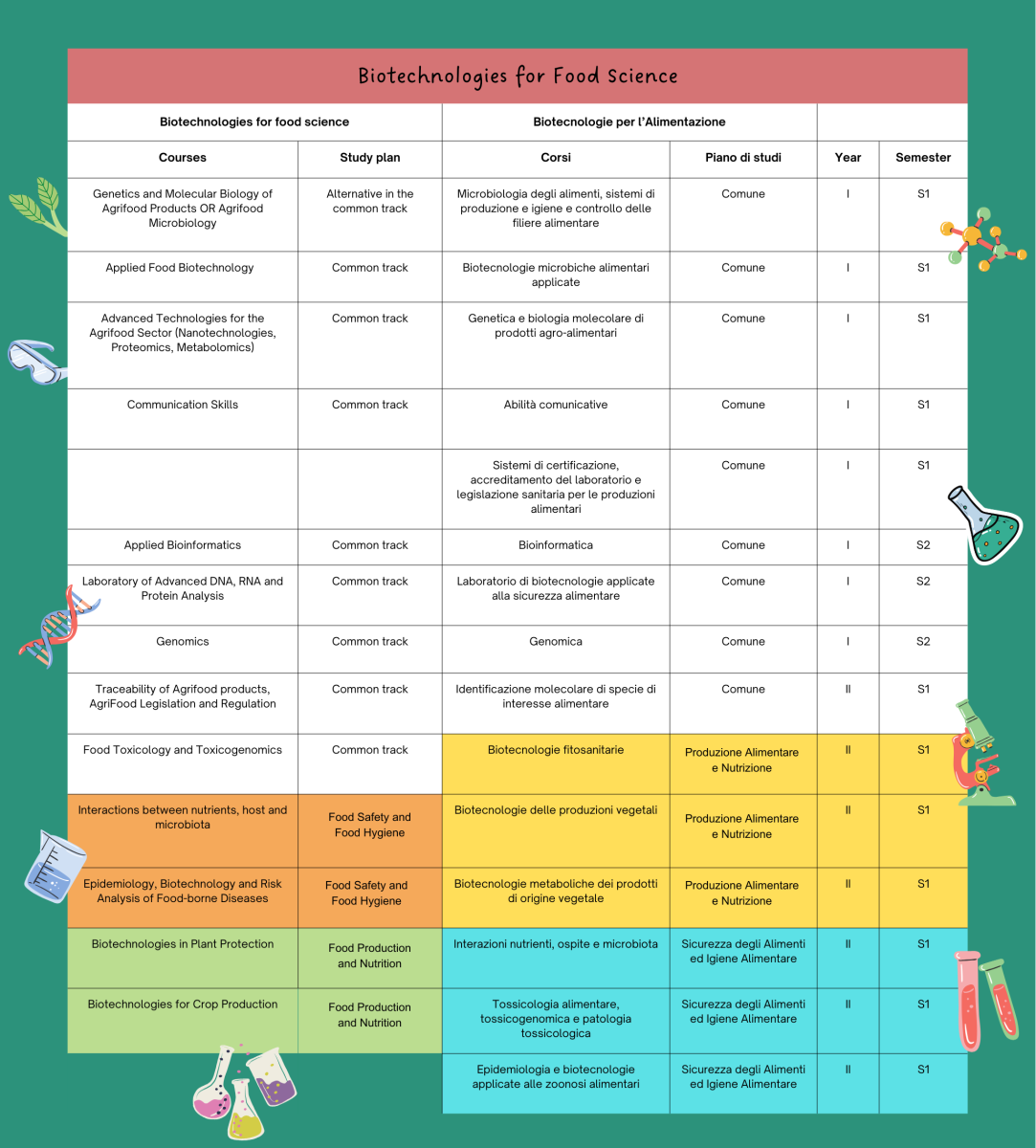Course outline and objectives
Course structure
(click on the picture to expand it)
The MSc encompasses two curriculum: Biotechnologies for Food Science (in English), and Biotecnologie per l’Alimentazione (in Italian).
The curriculum Biotechnologies for Food Science encompasses two study plans: Food Production and Nutrition (a), and Food Safety and Food Hygiene (b). These study plans differ each other for two courses (16 credits in toto):
- Food Production and Nutrition (a):
- Biotechnology in Plant Protection (8 credits);
- Biotechnology in Crop Production (8).
- Food Safety and Food Hygiene (b):
- Epidemiology, Biotechnology and Risk Analysis of Food-borne Diseases (8);
- Interactions between Nutrients, Host and Microbiota (8).
As to the curriculum in Biotecnologie per l’Alimentazione (in Italian), the undergraduate student can choose between the study plan in Produzione Alimentare e Nutrizione (c), and that in Sicurezza degli Alimenti ed Igiene Alimentare (d).
These study plans differ each other for three courses (26 credits in toto):
- Produzione Alimentare e Nutrizione (c):
- Biotecnologie delle Produzioni Vegetali (6);
- Biotecnologie Metaboliche dei Prodotti di Origine Vegetale (10);
- Biotecnologie Fitosanitarie (10).
- Sicurezza degli Alimenti ed Igiene Alimentare (d):
- Interazioni tra Nutrienti, Ospite e Microbiota (6);
- Tossicologia Alimentare, Tossicogenomica e Patologia Tossicologica (10);
- Epidemiologia e Biotecnologie Applicate alle Zoonosi Alimentari (10).
Furthermore (and interestingly), two “alternative” courses (8 credits each) are available within each curriculum: Genetics and Molecular Biology of Agrifood Products (Genetica e Biologia Molecolare dei Prodotti Agroalimentari); and Agrifood Microbiology (Microbiologia degli Alimenti, Sistemi di Produzione e Igiene e Controllo delle Filiere Alimentari). These alternative courses are useful for undergraduate students with a BSc in Food Science and Biotechnology or similar. Graduates in Food Science or similar are suggested including the former course in their study plan; however, the second one is suggested for graduates in Biotechnology. Being both of 8 credits, the course left free can be selected as elective subject.
Common to all the study plans is the course in Communication Skills/Abilità Comunicative (3 credits). Furthermore, twenty-four credits (the whole 4th semester) are attributed to the Final Dissertation/Prova Finale (i.e., thesis work).
To reach the 120 credits, the undergraduate must choose and insert in its study plan an elective subject for a minimum of 8 credits. This subject can be chosen within this same MSc academic offer or, alternatively, in that of other UNIPD MSc, active either in Agripolis than in other UNIPD Departments. Noteworthy, the syllabus of this elective subject must be pertinent to our Msc objectives and (most important) not related with topics covered in some of our MSc compulsory exams.
What will you learn
As to the educational objectives of our MSc, the undergraduate students will improve their communication skills and competences on animal and crop genomics, including most recent and advanced methods for high-throughput genomic analysis and selective breeding. In parallel, they will learn how to apply bioinformatics to management of large biological data sets, how these databases are organized and how to link different types of data. The knowledge on molecular bases of pathology, host-response to infection, diagnostics and epidemiology of transmissible diseases will be provided, too. Food-borne pathogens and the positive role of microorganisms in food processes, including the interactions among food, host and microbiota will be addressed in integrated microbiology courses. Courses on plant biotechnologies will introduce the molecular and physiological basic concepts of crop production and the information on best approaches to improve crop yield and reduce the impact of abiotic stresses. In parallel, how to implement the control of crop disease and pest management. Information on molecular tools for food traceability, -omics technologies (proteomics, metabolomics, nanotechnology) and their application to food production, together with the knowledge on food toxicology and EU and extra-EU food regulation will also be provided to undergraduates. Worth of mentioning, a specific training in bioinformatics, an intensive practical lab in DNA/RNA/protein analysis applied to food control as well as significant thematic lab sessions will be offered in dedicated lab practicals. The second semester will be completely dedicated to lab internship (thesis work). It will be possible to join a research lab in the campus, abroad (e.g., Erasmus) or to have a working stage in the private sector.





